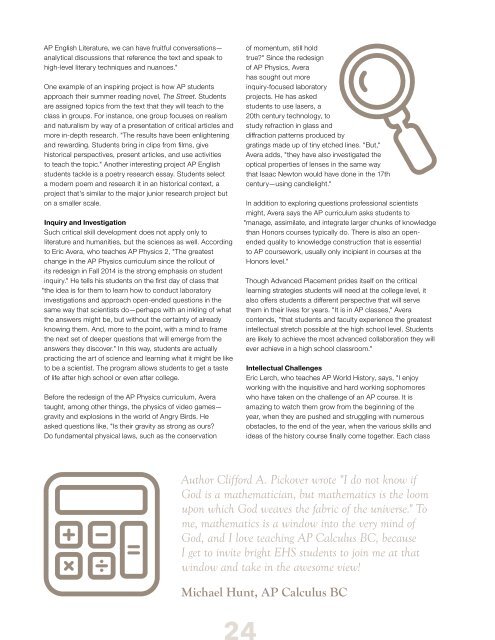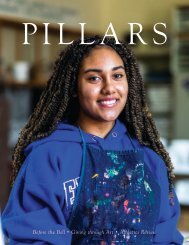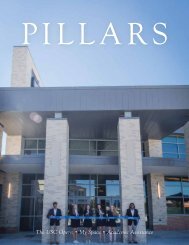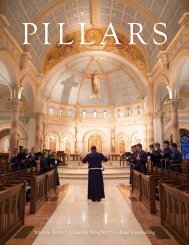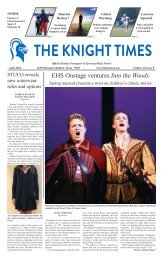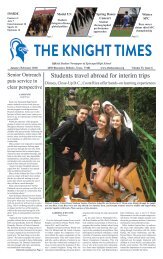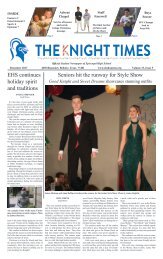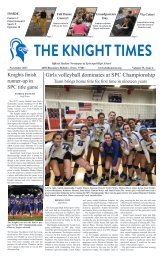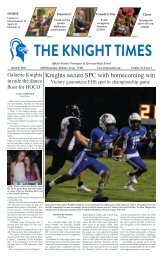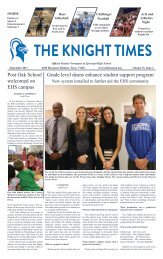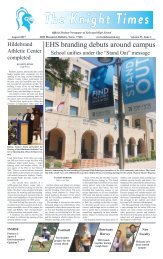EHS Pillars - Fall 2015
PILLARS - The Episcopal High School Magazine www.ehshouston.org
PILLARS - The Episcopal High School Magazine www.ehshouston.org
Create successful ePaper yourself
Turn your PDF publications into a flip-book with our unique Google optimized e-Paper software.
AP English Literature, we can have fruitful conversations—<br />
analytical discussions that reference the text and speak to<br />
high-level literary techniques and nuances."<br />
One example of an inspiring project is how AP students<br />
approach their summer reading novel, The Street. Students<br />
are assigned topics from the text that they will teach to the<br />
class in groups. For instance, one group focuses on realism<br />
and naturalism by way of a presentation of critical articles and<br />
more in-depth research. "The results have been enlightening<br />
and rewarding. Students bring in clips from films, give<br />
historical perspectives, present articles, and use activities<br />
to teach the topic." Another interesting project AP English<br />
students tackle is a poetry research essay. Students select<br />
a modern poem and research it in an historical context, a<br />
project that's similar to the major junior research project but<br />
on a smaller scale.<br />
Inquiry and Investigation<br />
Such critical skill development does not apply only to<br />
literature and humanities, but the sciences as well. According<br />
to Eric Avera, who teaches AP Physics 2, "The greatest<br />
change in the AP Physics curriculum since the rollout of<br />
its redesign in <strong>Fall</strong> 2014 is the strong emphasis on student<br />
inquiry." He tells his students on the first day of class that<br />
"the idea is for them to learn how to conduct laboratory<br />
investigations and approach open-ended questions in the<br />
same way that scientists do—perhaps with an inkling of what<br />
the answers might be, but without the certainty of already<br />
knowing them. And, more to the point, with a mind to frame<br />
the next set of deeper questions that will emerge from the<br />
answers they discover." In this way, students are actually<br />
practicing the art of science and learning what it might be like<br />
to be a scientist. The program allows students to get a taste<br />
of life after high school or even after college.<br />
Before the redesign of the AP Physics curriculum, Avera<br />
taught, among other things, the physics of video games—<br />
gravity and explosions in the world of Angry Birds. He<br />
asked questions like, "Is their gravity as strong as ours?<br />
Do fundamental physical laws, such as the conservation<br />
of momentum, still hold<br />
true?" Since the redesign<br />
of AP Physics, Avera<br />
has sought out more<br />
inquiry-focused laboratory<br />
projects. He has asked<br />
students to use lasers, a<br />
20th century technology, to<br />
study refraction in glass and<br />
diffraction patterns produced by<br />
gratings made up of tiny etched lines. "But,"<br />
Avera adds, "they have also investigated the<br />
optical properties of lenses in the same way<br />
that Isaac Newton would have done in the 17th<br />
century—using candlelight."<br />
In addition to exploring questions professional scientists<br />
might, Avera says the AP curriculum asks students to<br />
"manage, assimilate, and integrate larger chunks of knowledge<br />
than Honors courses typically do. There is also an openended<br />
quality to knowledge construction that is essential<br />
to AP coursework, usually only incipient in courses at the<br />
Honors level."<br />
Though Advanced Placement prides itself on the critical<br />
learning strategies students will need at the college level, it<br />
also offers students a different perspective that will serve<br />
them in their lives for years. "It is in AP classes," Avera<br />
contends, "that students and faculty experience the greatest<br />
intellectual stretch possible at the high school level. Students<br />
are likely to achieve the most advanced collaboration they will<br />
ever achieve in a high school classroom."<br />
Intellectual Challenges<br />
Eric Lerch, who teaches AP World History, says, "I enjoy<br />
working with the inquisitive and hard working sophomores<br />
who have taken on the challenge of an AP course. It is<br />
amazing to watch them grow from the beginning of the<br />
year, when they are pushed and struggling with numerous<br />
obstacles, to the end of the year, when the various skills and<br />
ideas of the history course finally come together. Each class<br />
Author Clifford A. Pickover wrote "I do not know if<br />
God is a mathematician, but mathematics is the loom<br />
upon which God weaves the fabric of the universe." To<br />
me, mathematics is a window into the very mind of<br />
God, and I love teaching AP Calculus BC, because<br />
I get to invite bright <strong>EHS</strong> students to join me at that<br />
window and take in the awesome view!<br />
Michael Hunt, AP Calculus BC


